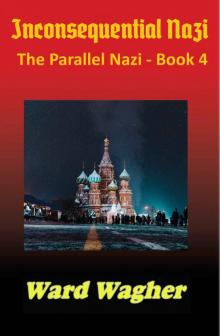- Home
- Ward Wagher
Inconsequential Nazi
Inconsequential Nazi Read online
Inconsequential
Nazi
The Parallel Nazi – Book 4
Ward Wagher
This is a work of fiction. All the characters and events portrayed in this book are fictional, and any resemblance to real people or incidents is purely coincidental.
Copyright © 2019 Ward Wagher
All rights reserved.
ISBN: 9781070980676
Cover photo by Nikita Karimov
www.unsplash.com
Books by Ward Wagher
The Parallel Nazi Series (Alternate History)
Accidental Nazi
Improbable Nazi
Impossible Nazi
Inconsequential Nazi
The Woogieverse
ruBracks, Nazis, the Death of the Universe, and Everything
Gravity Rising
The Last Paladin (Coming Soon)
The Scott Baughman Saga
Hannah Sorpat’s Eye (A Novel of Alien Abduction)
Without Beginning of Days
Witnesses in the Cloud
The Chronicles of Montora
The Mountains of Montora
The Margrave of Montora
The Snows of Montora
Christmas in Montora
The Diamonds of Montora
Harcourt’s World
The Wealth of the Worlds
The Caledon Emergence
Dynastic Ambition
DEDICATION
Dedicated to the destruction of tyranny everywhere.
.
CONTENTS
DEDICATION
CONTENTS
CHAPTER ONE
CHAPTER TWO
CHAPTER THREE
CHAPTER FOUR
CHAPTER FIVE
CHAPTER SIX
CHAPTER SEVEN
CHAPTER EIGHT
CHAPTER NINE
CHAPTER TEN
CHAPTER ELEVEN
CHAPTER TWELVE
CHAPTER THIRTEEN
CHAPTER FOURTEEN
CHAPTER FIFTEEN
CHAPTER SIXTEEN
CHAPTER SEVENTEEN
CHAPTER EIGHTEEN
CHAPTER NINETEEN
CHAPTER TWENTY
CHAPTER TWENTY-ONE
CHAPTER TWENTY-TWO
CHAPTER TWENTY-THREE
CHAPTER TWENTY-FOUR
CHAPTER TWENTY-FIVE
CHAPTER TWENTY-SIX
CHAPTER TWENTY-SEVEN
CHAPTER TWENTY-EIGHT
CHAPTER TWENTY-NINE
CHAPTER THIRTY
CHAPTER THIRTY-ONE
CHAPTER THIRTY-TWO
CHAPTER THIRTY-THREE
CHAPTER THIRTY-FOUR
CHAPTER THIRTY-FIVE
CHAPTER THIRTY-SIX
CHAPTER THIRTY-SEVEN
CHAPTER THIRTY-EIGHT
CHAPTER THIRTY-NINE
CHAPTER FORTY
CHAPTER FORTY-ONE
CHAPTER FORTY-TWO
CHAPTER FORTY-THREE
CHAPTER FORTY-FOUR
CHAPTER FORTY-FIVE
CHAPTER FORTY-SIX
CHAPTER FORTY-SEVEN
CHAPTER FORTY-EIGHT
CHAPTER FORTY-NINE
CHAPTER FIFTY
CHAPTER FIFTY-ONE
CHAPTER FIFTY-TWO
CHAPTER FIFTY-THREE
CHAPTER FIFTY-FOUR
CHAPTER FIFTY-FIVE
CHAPTER FIFTY-SIX
CHAPTER FIFTY-SEVEN
CHAPTER FIFTY-EIGHT
CHAPTER FIFTY-NINE
ABOUT THE AUTHOR
ACKNOWLEDGMENTS
Thanks to Ric, Bob and Walter who helped edit and provided advice.
.
CHAPTER ONE
December 4, 1942, 9 AM
Strasbourg, Germany
Erich Meisterlich wondered what on earth he had run into. True, this could hardly be called a routine arrest, but this went about five kilometers beyond the bounds of reason. He was crouched down behind his Horch as bullets zinged and whined past him. He had been proud the previous Monday when the Reichsprotektor, Karl Rainer had assigned him the duty to arrest the Gauleiter of Alsace.
Rainer had carefully explained the sensitive nature of the operation. The Gauleiter, Robert Wagner, had been an ongoing problem due to his gross cruelty to the people of the Alsace. The Reich Chancellor had hesitated to order his arrest due to his power base in the Nazi party. It appeared Schloss’s concerns were valid.
The convoy into Strasbourg had been uneventful and Meisterlich had enjoyed the picturesque city. The officer hoped that the mission would be relatively uneventful, even though Rainer had warned him to prepare for a violent response. What he had not expected was a full-fledged rebellion.
Meisterlich was an experienced officer and was rewarded for his loyalty to Rainer and Schloss. He was convinced it was well past time to deal with swine like Wagner. The man was widely known as the Butcher of Alsace. Meisterlich had picked twenty-four men to accompany him to Strasbourg to put the arrest into effect. He had been worried that Rainer would think him timid for drawing such a large troop for the mission. He now wished he had the authority to mobilize an entire army division because the situation was now about as desperate as it could get.
Gunfire was coming from multiple directions and the men who had accompanied him were getting picked off one by one. These were highly skilled soldiers, and they had managed to silence several of the attackers, but Wagner’s people had obviously taken the time to prepare the ambush. The gunfire started as he was getting out of his car, and all he had time to do was spin around, and crouch as he pulled his pistol from the holster.
One of his men screamed as he was hit, and then another toppled over soundlessly. Meisterlich knew he was not going to survive. His desire at that point was to take as many of Wagner’s people with him as he could. He rolled forward onto his stomach and slithered around to the other side of the car. Some part of him worried that his new uniform would be ruined from his excursion into the dirt and abrasive surface of the cobblestones.
Meisterlich eased up over the fender of the car and took bead on a second-floor window across the street from the party headquarters. He was good with his pistol, but the distance was long. As he was beginning to squeeze the trigger a rifle bullet entered above his eyes and took the back of his skull off in a spray of blood and brain matter. In his death spasm, his finger tightened on the trigger, causing the pistol to fire. He never knew that the bullet traveled unerringly through the window and killed the sniper.
§ § §
December 4, 1942, 9 AM
Reich Chancellor’s Officers
Reich Chancellery
Berlin, Germany
“Gau Alsace should be in custody about now,” Karl Rainer said.
He sat across from Heinrich Schloss, the Reich Chancellor, and sipped his coffee. The stocky, muscular man did not look like anyone’s idea of a Reichsprotektor, and Rainer was happy to allow people to underestimate him.
“You gave that job to Meisterlich, did you not?” Schloss asked. “Can you trust him?”
“Yes. Erich has been with me for years. He has accomplished numerous tough tasks for me. Not only that, but he hates the old guard.”
Schloss used his pencil to check mark each paragraph in the document as he read it. It was a report on the readiness of the Army divisions, and it was dry reading. He laid the paper down on his desk.
“Let’s hope he did not get overconfident, Karl. Wagner is ruthless. If he identifies the threat, things could get very warm for your Colonel Meisterlich.”
“Well, there is always a certain amount of risk. But Erich took twenty-four guards with him. I thought, perhaps, he was overdoing it just a little. But, barring a major misste
p on his part, I try not to micromanage him. He does a good job.”
“Let’s hope he does,” Schloss said. We don’t need someone like the Gau Alsace joining up with the Munich Faction. Things could get messy.”
“Believe me, that is my fondest hope.”
“What else do you have for me today, Karl?”
Rainer opened a folder and slid a piece of foolscap across the desk to his boss.
“This is a summary of our take from the agents I am running in England. The English are unmistakably reorienting their strategic posture for the Far East. They are doing a quick refurbishment of their aircraft carriers, and they are assembling what looks like a major armada.”
“So, they are obviously not interested in us,” Schloss murmured.
“That would be my conclusion.”
“What is your thinking, Karl?” Schloss asked. “Are they going to ask for transit of the Suez or are they going around Cape Horn to the American West Coast?”
“None of my sources know,” Rainer replied. “I asked Peter if he had heard anything, and he is drawing a blank as well.”
“One thing is certain,” Schloss commented, “when it finally comes out that Churchill ordered the assassination team that killed President Wallace, things will be very difficult for that alliance. My bet is that the English will ask for transit through the Suez Canal and will plan a landing somewhere in Australia.”
“Will they be able to force a landing?” Rainer asked.
“Hermann doesn’t think so. The English have four fleet carriers. And your people think they will have a couple of merchant hulls converted to carriers, so six total.”
“What do the Americans call them? Pocket Carriers?”
Schloss nodded. “Hermann explained to me that they picked it up from the English when they called the Graf Spee a pocket battleship. In any event, Goering believes that with just six carriers, the English fleet would not survive once it got into range of land-based aircraft. They may be getting ready to lose a lot of men and matériel. I hate to see that happen.”
“It would ease some of our worries,” Rainer commented.
“I understand what you are saying, Karl, but we are no longer at war. We should not get into the habit of wishing the English ill. I want to build a friendship with them.”
“Is that even possible?”
Schloss shrugged. “I recognize there has been a lot of water under that bridge. But historically, the Germans and the English have been friendly. If they decide we are not a threat, maybe they won’t send as many provocateurs into the Reich. Besides, if Stalin starts feeling frisky, I want the English as a friendly neutral at the very least. It would be even better if we were allied.”
“That may not be possible,” Rainer said. “From what my sources have gleaned, the English government is riddled with Communists. I think if we can keep them neutral, it will be a major accomplishment.”
“In that, you are in agreement with my brother-in-law,” Schloss stated. “They have a big problem, and everybody knows it. But the leadership over there doesn’t seem to be interested in doing anything about it.”
“That simply amazes me,” Rainer commented.
“And are we also riddled with Communists, Herr Rainer?” Schloss asked with eyebrows raised.
Rainer rocked his head back and forth. “Of course, it is hard to prove a negative, Herr Schloss. But I do not think we have a major problem. Oh, I am sure there are some sympathizers here and there, but if there were a major infestation, we would know about it.”
Schloss swung around and refilled his coffee cup from the thermos pitcher on the credenza behind his desk. He swung back to face Rainer.
“Let me know, Karl when you have Wagner in custody. We will need to get the new Gauleiter in place as soon as possible. At least he won’t have to change the nameplate on his door.”
“That will be the least of his problems, I think,” Rainer said as he chuckled. “At least Joseph Wagner isn’t beholden to the old guard.”
“For sure. But please, Karl, make sure the man has adequate security. When Hitler decided he didn’t need him anymore, the knives came out.”
“Indeed,” Rainer nodded. “My people don’t like him that much either. They think he’s a suck-up.”
“I think he is, too,” Schloss said. “But it took some courage for him to stand up against Hitler.”
“Either that, or he was a fool.”
Schloss looked at Rainer in surprise. “You suggested him to me for this position.”
“So, I did. But, I plan to keep a close eye on him. As with so many of our options, Herr Schloss, we seem to be left with selecting the lesser of the evils.”
“Right. Okay, I need to get back to work. Please let me know when you have the situation in Strasbourg under control.”
“Of course, Herr Schloss,” Rainer said, standing up.
“And, thanks for coming,” Schloss continued. “I could probably sit here all day and talk to you, but I keep seeing Willem peeking past the door to see if we’re through. I’m sure he has another stack of paper to drop on my desk. I need to send some of it over to you.”
Rainer laughed. “I have plenty of my own, thank you very much. Thanks for your time this morning.”
Schloss waved a hand in acknowledgment, but Rainer saw that his attention had already turned to the piece of paper on the top of the stack. If he didn’t stay on top of the workload, it would soon grow out of control.
He swung around and grabbed the Thermos of coffee and discovered it was empty.
“Willem,” he bawled, “more coffee.”
A few moments later Willem Kirche, Schloss’s personal secretary, slipped into the room with a fresh decanter of coffee and took the other one away.
“Here you go, Herr Reich Chancellor. You seem to be drinking more than usual this morning.”
“Yes,” he grumbled, “and you better not tell Gisela about it.”
“Of course. And Frau Schloss called and asked me to remind you that you are taking lunch with her, today.”
“Thanks for reminding me, Willem. I had forgotten that. Gisela was asleep when I left the apartment this morning.”
“Yes, Sir. And, the top three items on that stack will require your signature this morning, if possible. The Reichsmarshall has been insistent that you read them.”
“Oh, very well.”
Schloss picked up his omnipresent pencil and began reading the top page, moving the pencil down the page to keep his place. He reminisced briefly about the events over the past year and a half that had placed him in this position.
A history professor in a divided 1982 Berlin, Schloss had been trapped in some kind of unknown event that had tossed him to another Germany in 1941 where he witnessed Hitler’s death in a plane crash. In this universe, he was the Nazi Party leader. He discovered he had arrived in this position by murdering his predecessor Martin Bormann. The only link to his previous life was the elderly housekeeper who was both intimidating and mysterious.
Yet, Schloss immediately put into place a series of schemes to end the war with Britain; avoid war with the United States and the Soviet Union, and finally stop the slaughter of the Jews. He found himself implementing ideas he had discussed with his colleagues in his previous life – ideas which were both fanciful and regretful. His actions eventually led to a final showdown with Heinrich Himmler, from which Schloss emerged as the unquestioned master of the German Reich.
For the first time in his life, Heinrich Schloss felt fulfilled. In this world, he had a family, he had a woman he loved, and he had a shot at making Germany the unquestioned master of continental Europe. His former life receded to memories and dreams. The present was very real.
Upbraiding himself for his ruminations, Schloss returned to his work. Fortunately, he had no further appointments until the afternoon, and so he expected to clear off a lot of the paperwork. A couple of hours later Willem stuck his head in the door.
“The Reichsprotektor
is on the phone for you, Herr Reich Chancellor.”
“Very well, Willem. Put him through.”
A moment later his phone tinkled.
“Yes, Karl?” he said as he picked up the receiver.
“I just received a call from one of my people in Alsace. Wagner killed Meisterlich and all his men.”
Schloss squeezed the receiver hard and watched his fingers turn white as the blood was forced from them by his grip.
“Alsace is in rebellion, then,” he stated.
“I fear so.”
Schloss had a moment of stark clarity. If the Gauleiter Robert Wagner was in rebellion, then the old guard was still powerful. The question remained as to whether Wagner had rebelled because he had no other choice, due to the pending arrest, or he truly felt he could overturn the Schloss regime.
“Very well, Karl. I need to call Goering and get the army out of the barracks. And, I guess you have things to do.”
“Yes, Sir.”
“Okay.”
He hung up the phone and yelled to Willem. “Get me the Reichsmarshall on the phone. It’s an emergency.”
For once, Goering was in his office instead of out playing in the woods around his Karinhall estate.
“Yes, Herr Reich Chancellor. How may I help you this fine day?”
“Hermann, Gau Alsace is in rebellion. I don’t know what he has for forces, but you need to pull together whatever you can, and get to the border.”
“At once, Herr Reich Chancellor!” Goering sounded shocked, but immediately understood what was happening.”
“Will we be meeting today, Herr Reich Chancellor?” he asked, after a moment.
“Yes,” Schloss replied. “As soon as possible. Get the armed forces moving. Quickly, Hermann.”
Schloss quietly set the receiver back in its cradle. Things had been going so well for the past month. He had been a fool for assuming things would stay that way. Everyone’s lives had become immeasurably more complicated.

 The Mountains of Montora (The Chronicles of Montora Book 1)
The Mountains of Montora (The Chronicles of Montora Book 1) Nazi Magician: Inventor
Nazi Magician: Inventor The Last Paladin
The Last Paladin Inconsequential Nazi
Inconsequential Nazi Impossible Nazi
Impossible Nazi The Snows of Montora (The Chronicles of Montora Book 3)
The Snows of Montora (The Chronicles of Montora Book 3) The Margrave of Montora (The Chronicles of Montora Book 2)
The Margrave of Montora (The Chronicles of Montora Book 2) Gravity Rising (The Parallel Multiverse Book 2)
Gravity Rising (The Parallel Multiverse Book 2) ruBracks, Nazis, the Death of the Universe & Everything (The Parallel-Multiverse Book 1)
ruBracks, Nazis, the Death of the Universe & Everything (The Parallel-Multiverse Book 1) Improbable Nazi (Parallel Nazi Book 2)
Improbable Nazi (Parallel Nazi Book 2) Accidental Nazi
Accidental Nazi Improbable Nazi
Improbable Nazi